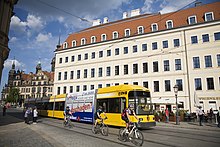
Back درگاه:شهرها Persian Wikipedia:Pooz/Städt KSH Portaal:Steden Dutch Cổng thông tin:Thành phố Vietnamese
The Cities Portal

A city is a human settlement of a notable size. The term "city" has different meanings around the world and in some places the settlement can be very small. Even where the term is limited to larger settlements, there is no universally agreed definition of the lower boundary for their size. In a more narrow sense, a city can be defined as a permanent and densely settled place with administratively defined boundaries whose members work primarily on non-agricultural tasks. Cities generally have extensive systems for housing, transportation, sanitation, utilities, land use, production of goods, and communication. Their density facilitates interaction between people, government organizations, and businesses, sometimes benefiting different parties in the process, such as improving the efficiency of goods and service distribution.
Historically, city dwellers have been a small proportion of humanity overall, but following two centuries of unprecedented and rapid urbanization, more than half of the world population now lives in cities, which has had profound consequences for global sustainability. Present-day cities usually form the core of larger metropolitan areas and urban areas—creating numerous commuters traveling toward city centres for employment, entertainment, and education. However, in a world of intensifying globalization, all cities are to varying degrees also connected globally beyond these regions. This increased influence means that cities also have significant influences on global issues, such as sustainable development, climate change, and global health. Because of these major influences on global issues, the international community has prioritized investment in sustainable cities through Sustainable Development Goal 11. Due to the efficiency of transportation and the smaller land consumption, dense cities hold the potential to have a smaller ecological footprint per inhabitant than more sparsely populated areas. Therefore, compact cities are often referred to as a crucial element in fighting climate change. However, this concentration can also have significant negative consequences, such as forming urban heat islands, concentrating pollution, and stressing water supplies and other resources. (Full article...)
Selected city -
Lagos (/ˈleɪɡɒs/ LAY-goss; also US: /ˈlɑːɡoʊs/ LAH-gohss; Yoruba: Èkó) or Lagos City is the most populous city in Nigeria (Self-proclaimed), with an estimated population of 21 million in 2015. Lagos is the most populous urban area in Africa. Lagos was the national capital of Nigeria until December 1991 following the government's decision to move their capital to Abuja in the centre of the country. Lagos is a major African financial centre and is the economic hub of Lagos State and Nigeria at large. The city has a significant influence on commerce, entertainment, technology, education, politics, tourism, art, and fashion in Africa. Lagos is also among the top ten of the world's fastest-growing cities and urban areas. The megacity has the fourth-highest GDP in Africa and houses one of the largest and busiest seaports on the continent. Due to the large urban population and port traffic volumes, Lagos is classified as a Medium-Port Megacity.
Lagos emerged as a home to the Awori subgroup of the Yoruba of West Africa islands, which are contained in the present day Local Government Areas (LGAs) of Lagos Island, Eti-Osa, Amuwo-Odofin and Apapa. The islands are separated by creeks, fringing the southwest mouth of Lagos Lagoon, while being protected from the Atlantic Ocean by barrier islands and long sand spits such as Bar Beach, which stretch up to 100 km (62 mi) east and west of the mouth. Due to rapid urbanisation, the city expanded to the west of the lagoon to include areas in the present day Lagos Mainland, Ajeromi-Ifelodun, and Surulere. This led to the classification of Lagos into two main areas: the Island, which was the original city of Lagos, and the Mainland, which it has since expanded into. This city area was governed directly by the Federal Government through the Lagos City Council, until the creation of Lagos State in 1967, which led to the splitting of Lagos city into the present-day seven Local Government Areas (LGAs), and an addition of other towns (which now make up 13 LGAs) from the then Western Region to form the state. (Full article...)Did you know -
- ... that Gloria Rojas, one of the first Latina broadcast journalists in New York City, helped launch the career of Geraldo Rivera?
- ... that while 1271 Avenue of the Americas was being built at New York City's Rockefeller Center, Marilyn Monroe re-launched the Center's long-dormant "Sidewalk Superintendents' Club"?
- ... that a former radio host got a free apartment in New York City's King Manor and lived there for more than three decades?
- ... that L. P. Hollander & Company filed for bankruptcy less than two years after moving its New York City store to 3 East 57th Street?
- ... that Winchester United Church, a place of worship in the City of Winchester District, Hampshire, was built into the walls of the former county jail?
- ... that unlike other armories in New York City, the 69th Regiment Armory was designed in the Beaux-Arts style because its architect did not want it to look like a "mediaeval castle"?
Related portals
Related WikiProjects
Enugu (/eɪˈnuːɡuː/ ay-NOO-goo; Igbo: Énugwú) is the capital city of Enugu State in Nigeria. It is located inland in the Southeastern part of Nigeria. In 2006, the city had a population of 820,000 according to the last Nigerian census.
The name Enugu is derived from the two Igbo words Énú úgwú, meaning "hill top", denoting the city's hilly geography. Enugu acquired township status in 1917 and was called Enugwu-Ngwo. Because of its rapid expansion towards areas owned by other indigenous communities, the city was renamed Enugu in 1928. Since the 17th century the location of present-day Enugu has been inhabited by the Enugwu-Ngwo and Nike (/niːˈkeɪ/ nee-KAY) subgroups of the Igbo people. (Full article...)Selected article -

A sustainable city, eco-city, or green city is a city designed with consideration for social, economic, environmental impact (commonly referred to as the triple bottom line), and resilient habitat for existing populations, without compromising the ability of future generations to experience the same. The UN Sustainable Development Goal 11 defines sustainable cities as those that are dedicated to achieving green sustainability, social sustainability and economic sustainability. They are committed to doing so by enabling opportunities for all through a design focused on inclusivity as well as maintaining a sustainable economic growth. The focus will also includes minimizing required inputs of energy, water, and food, and drastically reducing waste, output of heat, air pollution – CO2, methane, and water pollution. Richard Register, a visual artist, first coined the term ecocity in his 1987 book Ecocity Berkeley: Building Cities for a Healthy Future, where he offers innovative city planning solutions that would work anywhere. Other leading figures who envisioned sustainable cities are architect Paul F Downton, who later founded the company Ecopolis Pty Ltd, as well as authors Timothy Beatley and Steffen Lehmann, who have written extensively on the subject. The field of industrial ecology is sometimes used in planning these cities.
The UN Environment Programme calls out that most cities today are struggling with environmental degradation, traffic congestion, inadequate urban infrastructure, in addition to a lack of basic services, such as water supply, sanitation, and waste management. A sustainable city should promote economic growth and meet the basic needs of its inhabitants, while creating sustainable living conditions for all. Ideally, a sustainable city is one that creates an enduring way of life across the four domains of ecology, economics, politics, and culture. The European Investment Bank is assisting cities in the development of long-term strategies in fields including renewable transportation, energy efficiency, sustainable housing, education, and health care. The European Investment Bank has spent more than €150 billion in bettering cities over the last eight years. (Full article...)General images -
Topics
List articles
Subcategories
Associated Wikimedia
The following Wikimedia Foundation sister projects provide more on this subject:
-
Commons
Free media repository -
Wikibooks
Free textbooks and manuals -
Wikidata
Free knowledge base -
Wikinews
Free-content news -
Wikiquote
Collection of quotations -
Wikisource
Free-content library -
Wikiversity
Free learning tools -
Wiktionary
Dictionary and thesaurus
© MMXXIII Rich X Search. We shall prevail. All rights reserved. Rich X Search








































